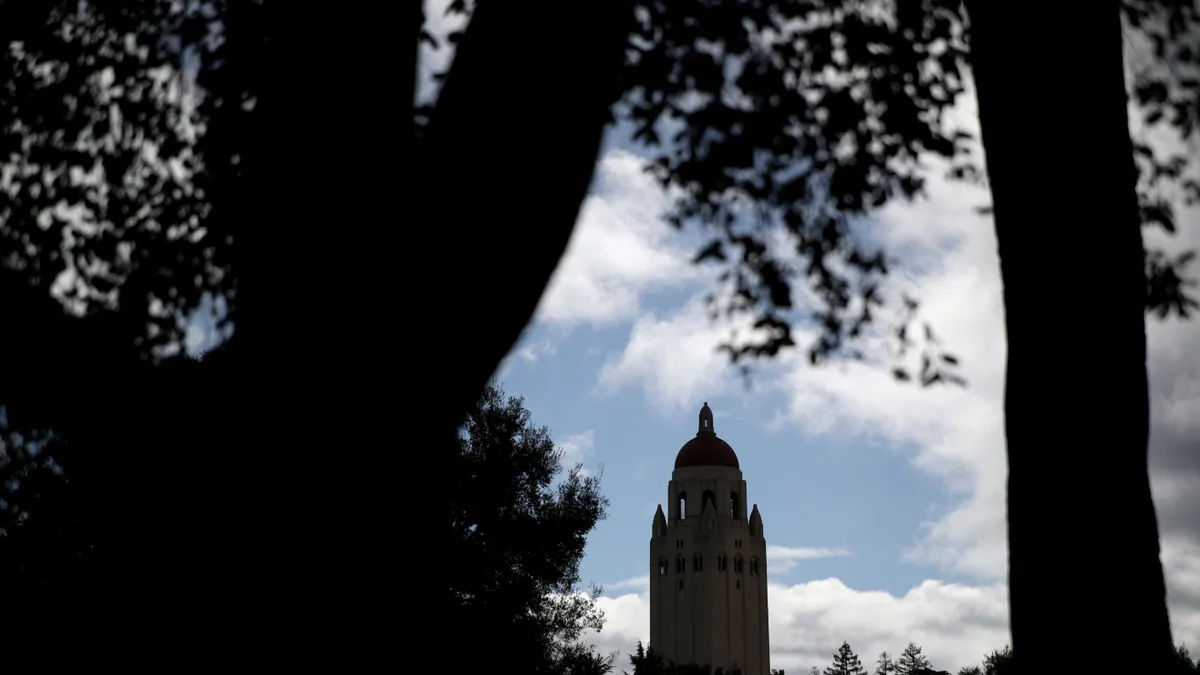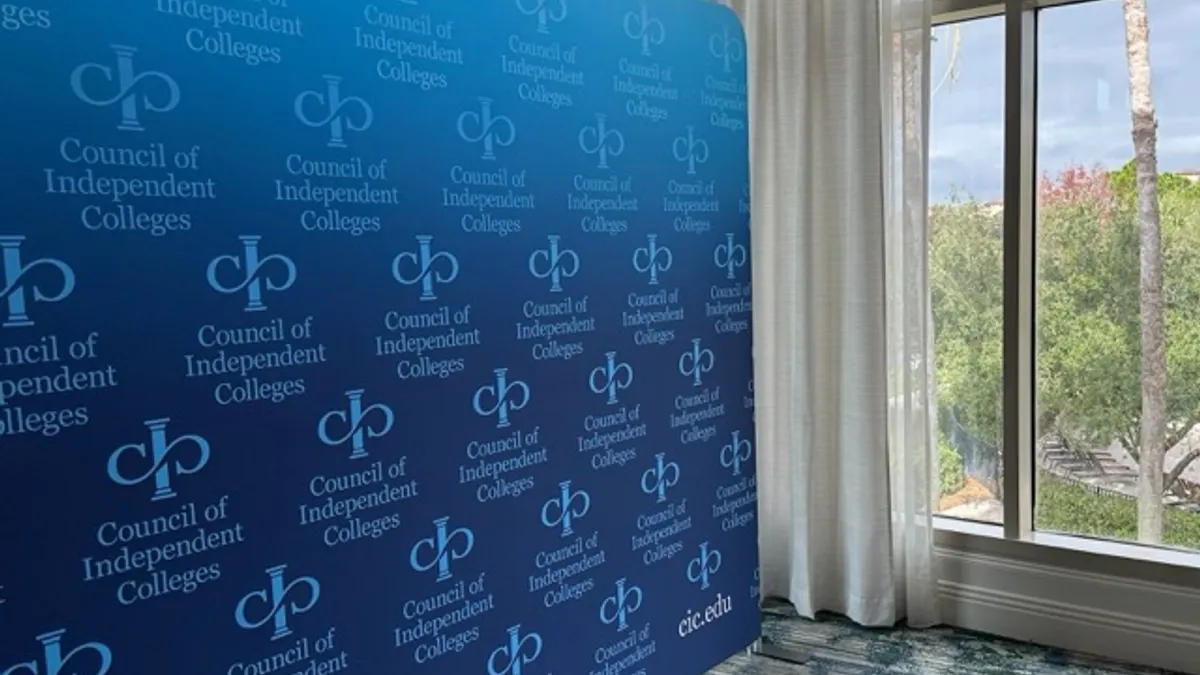Dive Brief:
- The Foundation for Individual Rights and Expression on Wednesday sued top Trump administration officials, alleging their attempts to deport student visa holders over speech have violated the constitutional right to free expression and due process.
- The free speech advocacy organization filed the lawsuit on behalf of Stanford University’s independent student newspaper and two unnamed plaintiffs who entered the U.S. on student visas. It accuses the Trump administration of illegally deporting those it deems to have “anti-American or anti-Israel” views, creating a "pall of fear" that is "incompatible with American liberty."
- The lawsuit is asking a federal judge to bar U.S. Secretary of State Marco Rubio from making the plaintiffs eligible for deportation and U.S. Homeland Security Secretary Kristi Noem from initiating deportation proceedings based on their speech.
Dive Insight:
Beginning in March, the Trump administration began targeting international students studying at U.S. colleges, including but not limited those who had participated in pro-Palestinian campus protests or published commentary criticizing Israel. The wide-ranging campaign resulted in the federal government revoking at least 800 student visas by April 11.
Later that month, the Trump administration walked back hundreds of the visa revocations amid intense legal scrutiny. But it then published a policy expanding the authority of U.S. Immigration and Customs Enforcement to terminate educational visas.
Evidence of an international student’s failure to comply with the terms of their legal status — not proof or “clear and convincing evidence” — would be enough for ICE to revoke it, according to guidance from law firm Hunton. The new policy did not address the federal government’s practice of terminating students’ visas without notifying them — meaning they may still have their legal status pulled without them or their colleges being informed, the firm added.
Under the administration's current policies, the plaintiffs face "an ongoing and credible threat” of student visa terminations and deportation proceedings, the lawsuit said.
The Trump administration has cited two provisions of the Immigration and Nationality Act to justify these moves — one that allows Rubio to revoke student visas and another that allows him to determine a noncitizen is eligible for deportation if their statements or associations “compromise a compelling United States foreign policy interest.”
FIRE's lawsuit alleges these provisions are unconstitutional when used to target free speech rights — which apply to all in the U.S., not just American citizens.
“Secretary Rubio and the Trump administration’s war against noncitizens’ freedom of speech is intended to send an unmistakable message: Watch what you say, or you could be next,” the lawsuit said.
The plaintiffs intend to seek permanent injunctive relief from the U.S. Supreme Court, the only court with the authority to "enjoin or restrain" aspects of the Immigration and Nationality Act.
At The Stanford Daily, student writers who are attending the university on a visa are turning down assignments related to the conflict in the Middle East over concerns their reporting would endanger their immigration status, the lawsuit alleges.
Other such reporters are requesting to have their published articles taken down or are quitting the newspaper altogether out of fear of deportation.
Beyond the newsroom, international students have also largely stopped talking to the Daily's staff since March, the lawsuit said. When they do, they often refuse to speak on the record, "particularly when it comes to discussing topics like Israel and Palestine," it said.
“There’s real fear on campus and it reaches into the newsroom,” Greta Reich, editor-in-chief of the student newspaper, said in a statement. “The Daily is losing the voices of a significant portion of our student population.”
Both of the unnamed plaintiffs entered the U.S. on F-1 student visas, hold no criminal record, and have publicly voiced pro-Palestinian views. But both began self-censoring over "their rational concern about the ongoing danger of deportation for expression Secretary Rubio deems anti-American or anti-Israel," the lawsuit alleges
One of the plaintiffs had been a member of her university's chapter of Students for Justice in Palestine and criticized America's relationship with Israel online. Her work led to her inclusion on Canary Mission, an anonymous website that “publishes the personal information of students, professors and organizations it deems ‘anti-Israel,’” according to the lawsuit.
The website has repeatedly been accused of the doxxing of students and protesters, which free speech experts say can chill protected political speech and incite violence.
The lawsuit cited testimony from Peter Hatch, assistant director of ICE's Homeland Security Investigations department, in which he told lawmakers that “most” of the student protesters DHS asked ICE to investigate came from Canary Mission’s website.
Among its posts, the website had published information on Mahmoud Khalil, Rümeysa Öztürk, and Mohsen Mahdawi prior to the Trump administration detaining and attempting to deport them. All three current and former students have since been released on the orders of federal judges.
Aware of this environment, the plaintiff has "refrained from publishing and voicing her true opinions regarding Palestine and Israel" since March and deleted a social media account "to guard against retaliation for past expression."
Likewise, the other unnamed plaintiff previously attended pro-Palestinian protests and published both pro-Palestinian and anti-Israel commentary. But he began self-censoring his work over fears of deportation, according to the lawsuit.
He also served as a teaching assistant at his college, and the course's professor advised him to reconsider his advocacy related to Israel and Palestinians, as it might endanger his immigration status, the complaint said.
"No one should fear a midnight knock on the door for voicing the wrong opinion," the lawsuit said. But the Trump administration, and Rubio in particular, are working to make free speech "a privilege contingent upon the whims of a federal bureaucrat," it said.















